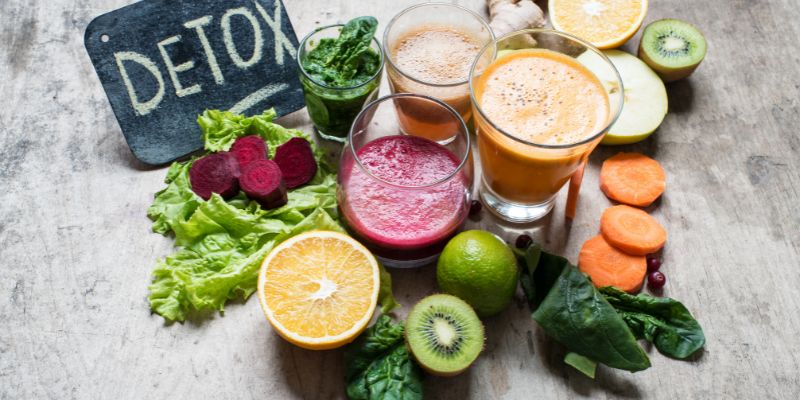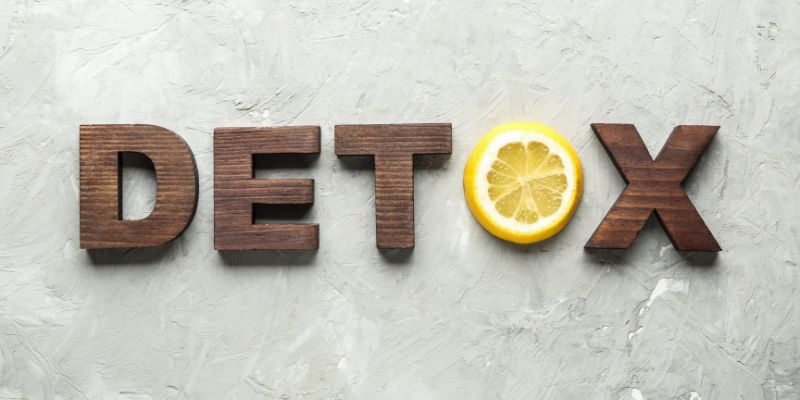What Is a Detox Diet: A Complete Guide
Nov 21, 2023 By Nancy Miller
As a thought to be the answer to purging the body of impurities and enhancing health, detox diets have become more popular. These regimens—which frequently include particular diets and lifestyle choices—seek to purge the body of harmful chemicals while revitalizing general health. Proponents assert advantages include more energy, reduced weight, and cleaner skin.
Despite the hype, it's important to have a critical grasp of what a detox diet entails, as well as any potential advantages and the crucial factors that must be taken into account to guarantee both efficacy and safety. Investigating the details of these diets reveals their possible drawbacks as well as their potential benefits for leading a healthy lifestyle.

What Is A Detox Diet?
A detox plan is a diet that eliminates toxins to promote health. These regimens recommend eating exclusively particular foods. Instead of processed meals or chemicals, consume whole foods, fruits, vegetables, juices, and herbal supplements. Detox diets are believed to aid the skin, kidneys, and liver in eliminating toxins and waste.
These diets promise energy, nourishment, cleaner skin, and weight loss. The research behind these statements could be better and clearer. Some individuals dislike detox diets because they contain strict regulations that might create nutritional deficiencies and can't be maintained. Before commencing a detox regimen, see a doctor or nurse to ensure safety and success.

Common Detoxification Methods
Detoxification methods encompass a spectrum of practices, each intended to cleanse the body and eliminate toxins. Dietary changes, fasting, and cleansing rituals are common detox methods. Dietary detoxification is avoiding processed foods, chemicals, and refined sweets and eating whole, unprocessed foods rich in antioxidants, vitamins, and minerals.
Fasting, such as juice or intermittent fasting, allows the body to relax and eliminate toxins. Additionally, herbal supplements, detox teas, and various beverages are commonly used to support detoxification by promoting liver function and aiding in waste elimination. The goal of cleaning rituals such as saunas and colon cleansing is to help the body eliminate toxins through sweat, bowel movements, and other processes.
While these methods are widely adopted in detox regimens, their efficacy and safety remain debated within the scientific community. It's crucial to approach detoxification practices cautiously, considering individual health conditions and consulting healthcare professionals to ensure the chosen method is safe and appropriate.
Unveiling the Truths Behind Detox Diets
Detox diets involve dispelling common misconceptions and unfounded beliefs about their effectiveness and benefits. One prevalent myth is that detox diets are a quick fix for weight loss. While initial weight loss might occur due to water weight reduction, these diets primarily lack scientific evidence for sustained fat loss.
Some toxins are supposed to be eliminated by detox diets; however, there is little empirical evidence. Detox diets are also advertised as cures for skin and chronic diseases. They do not have solid scientific evidence for healing or avoiding certain diseases.
Since our organs, like the liver and kidneys, cleanse normally, the belief that the body needs external treatments to detoxify is false. To dispel these illusions, promote a realistic view of detox diets and the significance of balanced eating, moderate exercise, and good lifestyle practices for long-term health.
How Does the Body Eliminate Toxins?
The body employs several natural mechanisms to eliminate toxins, ensuring proper functioning and health. Organs like the liver, kidneys, lungs, skin, and digestive system play pivotal roles in detoxification.
- Liver Detoxification: Filtering and neutralizing poisons is mostly done by the liver. It transforms harmful substances into less harmful compounds, facilitating their removal from the body.
- Kidney Filtration: Kidneys filter waste products and toxins from the blood, excreting them as urine. Proper hydration is crucial for optimal kidney function.
- Lung Excretion: Lungs expel toxins by releasing carbon dioxide during respiration, eliminating volatile substances and pollutants breathed in from the environment.
- Skin Purification: Sweat glands in the skin eliminate certain toxins. Saunas or sweating during physical activities aid in toxin excretion through the skin.
- Digestive Elimination: The digestive system removes toxins through bowel movements. Adequate fiber intake supports regularity, facilitating the removal of waste and toxins from the body.
Understanding these natural detoxification processes highlights the body's inherent ability to eliminate toxins without extreme dietary interventions—a balanced diet and healthy lifestyle support these natural detox mechanisms.
Benefits of Fruits and Veggies in Detox
Incorporating fruits and vegetables into a detox diet amplifies its effectiveness significantly. Fruits and vegetables provide nutritional vitamins, minerals, antioxidants, and dietary fiber that aid in the body's natural detoxification process. They wash out toxins and hydrate the body with high water content and fiber, promoting regular bowel motions.
Antioxidant-rich fruits and vegetables like berries, spinach, and kale neutralize free radicals and minimize oxidative stress, essential during detox. They boost liver function, which detoxifies the body, due to their nutritional richness.
By integrating a variety of fruits and vegetables into a detox diet, individuals harness the inherent virtues of these wholesome foods, promoting detoxification, supporting vital organs, and nurturing overall health and well-being.
Disadvantages of Detox Diets
- Nutrient Deficiency: Detox diets often restrict food groups, potentially leading to inadequate intake of essential nutrients like protein and fats. Prolonged restriction may cause deficiencies in vital vitamins and minerals, affecting overall health.
- Fatigue and Weakness: Drastic calorie reduction in detox diets can cause fatigue, weakness, and dizziness due to low energy intake. It can impact daily activities and exercise routines negatively.
- Metabolism and Muscle Loss: Extremely restrictive diets can negatively impact long-term weight control objectives by slowing metabolism and causing muscle loss.
- Potential for Disordered Eating: Extreme dieting behaviors in detox plans might trigger unhealthy eating patterns or exacerbate disordered eating habits in susceptible individuals.
- Dehydration and Electrolyte Imbalance: Some detox approaches promote excessive fluid intake or use diuretics, risking dehydration and electrolyte imbalances, potentially affecting heart health.
- Short-term Solution: Detox diets often offer short-term results but may not provide sustainable health benefits.
It's essential to approach detox diets cautiously and consider consulting a healthcare professional before beginning any restrictive diet plan.
Conclusion:
Detox diets, despite their popularity, pose potential risks and misconceptions. While they promise various health benefits, their efficacy needs more scientific backing. Misguided beliefs often exaggerate their ability to eliminate toxins or promote weight loss, overlooking the body's natural detox mechanisms. Nutritional deficiencies, fatigue, and disordered eating patterns are common pitfalls.
Instead, emphasizing a balanced diet, regular exercise, and healthy lifestyle habits supports the body's inherent detox processes. Understanding the limitations and potential risks of detox diets is crucial, ensuring informed choices toward sustainable well-being and steering clear of extreme dietary interventions







